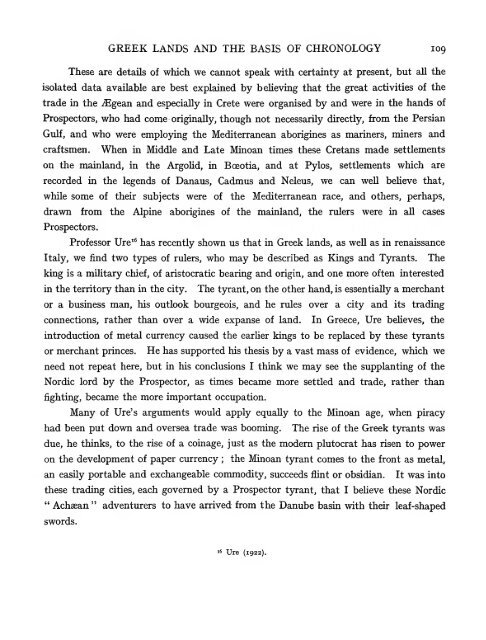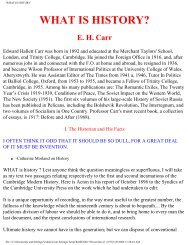The bronze age and the Celtic world - Universal History Library
The bronze age and the Celtic world - Universal History Library
The bronze age and the Celtic world - Universal History Library
You also want an ePaper? Increase the reach of your titles
YUMPU automatically turns print PDFs into web optimized ePapers that Google loves.
GREEK LANDS AND THE BASIS OF CHRONOLOGY 109<br />
<strong>The</strong>se are details of which we cannot speak with certainty at present, but all <strong>the</strong><br />
isolated data available are best explained by believing that <strong>the</strong> great activities of <strong>the</strong><br />
trade in <strong>the</strong> ^gean <strong>and</strong> especially in Crete were organised by <strong>and</strong> were in <strong>the</strong> h<strong>and</strong>s of<br />
Prospectors, who had come originally, though not necessarily directly, from <strong>the</strong> Persian<br />
Gulf, <strong>and</strong> who were employing <strong>the</strong> Mediterranean aborigines as mariners, miners <strong>and</strong><br />
craftsmen. When in Middle <strong>and</strong> Late Minoan times <strong>the</strong>se Cretans made settlements<br />
on <strong>the</strong> mainl<strong>and</strong>, in <strong>the</strong> Argolid, in Boeotia, <strong>and</strong> at Pylos, settlements which are<br />
recorded in <strong>the</strong> legends of Danaus, Cadmus <strong>and</strong> Neleus, we can well beUeve that,<br />
while some of <strong>the</strong>ir subjects were of <strong>the</strong> Mediterranean race, <strong>and</strong> o<strong>the</strong>rs, perhaps,<br />
drawn from <strong>the</strong> Alpine aborigines of <strong>the</strong> mainl<strong>and</strong>, <strong>the</strong> rulers were in all cases<br />
Prospectors.<br />
Professor Ure'* has recently shown us that in Greek l<strong>and</strong>s, as well as in renaissance<br />
Italy, we find two types of rulers, who may be described as Kings <strong>and</strong> Tyrants. <strong>The</strong><br />
king is a military chief, of aristocratic bearing <strong>and</strong> origin, <strong>and</strong> one more often interested<br />
in <strong>the</strong> territory than in <strong>the</strong> city. <strong>The</strong> tyrant, on <strong>the</strong> o<strong>the</strong>r h<strong>and</strong>, is essentially a merchant<br />
or a business man, his outlook bourgeois, <strong>and</strong> he rules over a city <strong>and</strong> its trading<br />
connections, ra<strong>the</strong>r than over a wide expanse of l<strong>and</strong>. In Greece, Ure believes, <strong>the</strong><br />
introduction of metal currency caused <strong>the</strong> earlier kings to be replaced by <strong>the</strong>se tyrants<br />
or merchant princes. He has supported his <strong>the</strong>sis by a vast mass of evidence, which we<br />
need not repeat here, but in his conclusions I think we may see <strong>the</strong> supplanting of <strong>the</strong><br />
Nordic lord by <strong>the</strong> Prospector, as times became more settled <strong>and</strong> trade, ra<strong>the</strong>r than<br />
fighting, became <strong>the</strong> more important occupation.<br />
Many of Ure's arguments would apply equally to <strong>the</strong> Minoan <strong>age</strong>, when piracy<br />
had been put down <strong>and</strong> oversea trade was booming. <strong>The</strong> rise of <strong>the</strong> Greek tyrants was<br />
due, he thinks, to <strong>the</strong> rise of a coin<strong>age</strong>, just as <strong>the</strong> modern plutocrat has risen to power<br />
on <strong>the</strong> development of paper currency ;<br />
<strong>the</strong> Minoan tyrant comes to <strong>the</strong> front as metal,<br />
an easily portable <strong>and</strong> exchangeable commodity, succeeds flint or obsidian. It was into<br />
<strong>the</strong>se trading cities, each governed by a Prospector tyrant, that I believe <strong>the</strong>se Nordic<br />
" Achaean " adventurers to have arrived from <strong>the</strong> Danube basin with <strong>the</strong>ir leaf-shaped<br />
swords.<br />
'* Ure (1922).







